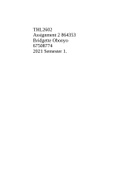THL2602
Assignment 2 864353
Bridgette Obonyo
67508774
2021 Semester 1.
,Bridgette Obonyo THL2602 Assignment 2
Part 1: Poetry, Question 2
, Bridgette Obonyo THL2602 Assignment 2
Forms of Syntactic foregrounding in poetry.
According to the Russian formalists, poetic language differs from ordinary language in that it
deviates from ordinary language (Carusi & Oliphant 2007:73). This deviation occurs with the use of
formal devices such as rhyme and meter amongst others, as well as with the heavy use of figurative
language (Carusi & Oliphant 2007:73). This deviation from ordinary language draws attention to the
formal aspects of the language instead of allowing them to fade into the background, thereby
foregrounding them (Carusi & Oliphant 2007:73). This deviation from ordinary language results in
defamiliarization- it makes the language strange and unfamiliar (Carusi & Oliphant 2007:75). This
defamiliarization forces the receiver of the poem to perform a closer reading, as well as forces them
to come to new and unusual conclusions and understandings of a work (Carusi & Oliphant 2007: 75).
One way that poetic language deviates from ordinary language is in syntactic foregrounding. Syntax
refers to the way in which words are arranged in a normal well- formed sentence (Oxford reference,
2021). In the use of syntactic foregrounding, poetic language is manipulated so that it deviates from
normal language, making it strange and unfamiliar, or defamiliarized (Oliphant & Keuris 2010:19).
This deviation serves to highlight or foreground certain elements of the language, as well as provides
structure and organisation to the work by connecting different metaphors, which aids in
interpretation of the work (Oliphant & Keuris 2010:19. Some forms of syntactic foregrounding are
accentuation, creation of hierarchies, shifts in accent, ambiguity, Semanticisation, and creation of
relationship (Oliphant & Keuris 2010:19), all of which will be discussed in this essay by analysing a
selection of poems. These poems are: War is kind by Stephen Crane, Hope by Emily Dickinson, Child
By Silvia Plath, XIV or Pity this busy minster manunkind by EE cummings, and it could have been a
lonely night Minji Karibo
The poem XIV, also known as Pity This Busy Monster Manunkind by E.E. Cummings makes use of
ambiguity. Ambiguity is a device used in poetry to expand the meaning of words or phrases so that
they may be interpreted in several different ways (Oliphant & Keuris 2010:28). These interpretations
can be considered individually or can be combined into one single interpretation that is a
conglomerate of the rest (Oliphant & Keuris 2010:28). A word or phrase is ambiguous when it has
multiple meanings, or when the meaning is not, at least at first, obvious (Oliphant & Keuris 2010:28).
When the reader of a poem encounters ambiguity, they must first reconstruct the sentence or
phrase in its normal semantic, syntactic and grammatical forms so that they may then consider how
its presentation in the poem affects its meaning and interpretation (Oliphant & Keuris 2010:28).
In XIV, The word “Manunkind” (line 1) is ambiguous as this made up word can be understood in two
ways. Firstly, the word could be interpreted as meaning that human beings have become cruel and
unkind like a “monster”. This interpretation is supported by the metaphor which manunkind is a part
of, “monster” being the vehicle and “manunkind” the tenor (line 1). This interpretation is also
supported by the word “not” in line 2, which suggests that human beings are not to be pitied,
because they are monstrous. A second interpretation of the word “manunkind” and the tenor-
vehicle construction it forms a part of is that man has become divorced from their natural state and
from nature itself, so much so that man has become less human. Man is unmade and has come to
resemble a monster as opposed to a creature of nature. In this case the negation of the verb “pity”
(line 1) implies that manunkind is not to be pitied as they have brought their current state upon
themselves. Both interpretations can be combined. In the human quest for advancement and
progress, people have distanced themselves from nature, which as a consequence has turned them
into monsters who cannot appreciate or care for the natural world around them, and who then




